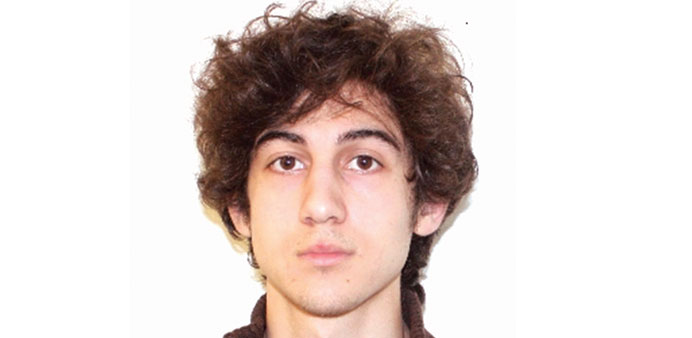|
Dzhokhar Tsarnaev’s dark, unkempt hair hung over his eyes as he leaned forward and, in a light Chechen accent, coolly stated “not guilty” to killing four people and injuring hundreds in the Boston Marathon bombing and the terrifying days that followed. |
The lanky 19-year-old walked into the courtroom on Wednesday at the US District Courthouse in Boston with a white cast on his left wrist and his orange prison jumpsuit unbuttoned to the waist, revealing a black shirt beneath.
Tsarnaev’s eyes wandered around the room but avoided much of the crowd gathered behind him, which included 30 victims and family members of victims.
Peter Payack, Tsarnaev’s high school wrestling coach, was one of the first of many people turned away from the courtroom, after members of the media and the public lined up hours prior in hopes of attending the hearing. He and scores of others resigned themselves to watching the arraignment on screens placed in two overflow rooms.
Tsarnaev had been a decorated athlete and wrestling team captain when he finished school two years ago.
“I wanted him to see me,” the disappointed Payack, a dedicated marathon runner, said. “I was feeling that if there was any spark of humanity left in him that maybe - if he saw his old wrestling family - he would make a connection.”
As the court clerk read the 30 charges against him - 17 of which carry the possibility of the death penalty if convicted - Tsarnaev adjusted his jumpsuit and rubbed his chin. The audience behind him sat still and quiet.
“It was a little bit upsetting, just being in the same room with him,” Mildred Valverde, a 44-year-old Somerville, Massachusetts, resident told reporters after the arraignment.
She walked with a crutch to support her still-damaged right leg, which was injured when the first bomb exploded April 15 in the crowd near the marathon finish line.
Throughout the 10-minute arraignment, Tsarnaev appeared unfazed by the weight of the charges against him. Flanked by two of his attorneys, he stood without shuffling his feet while the litany of charges were read and prosecutors announced that they would call 80 to 100 witnesses against him in what could be a four-month trial.
As the arraignment ended, Judge Marianne Bowler dismissed the court, and Tsarnaev quickly stood, placing his hands behind his back so that a court officer could handcuff him and lead him away.
Tight-lipped bombing victims and their families filed out of the courtroom and past a throng of reporters outside the courthouse.
Among the crowd exiting the courtroom were several members of Tsarnaev’s family. Escorted by two law enforcement officers, they made their way to a crowded bank of elevators. One woman in the group shielded her face with a white veil and appeared to be weeping.
Payack said it has been almost impossible over the last three months for him to imagine how the sweet boy he once coached could have committed the heinous acts of which he stands accused.
Just two months before the bombings, Tsarnaev, who was then in college, returned to Cambridge Rindge and Latin School to visit his old teammates at a wrestling practice, joking and hugging his old friends. He seemed happy, Payack said.
At times, on Wednesday, watching Tsarnaev on the closed-circuit video from the overflow room, Payack observed “flashes of the old Dzhokhar that we knew, we loved, and respected.” Tsarnaev’s orange jumpsuit hung loosely, as the skinny teenager’s clothes always had, and his quiet attitude reminded Payack of the young Chechen immigrant who excelled at wrestling and seemed to enjoy life in the US.
“Then you see all the victims behind him,” Payack said, “and it’s hard to reconcile.” - DPA

